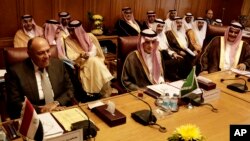Saudi Arabia asked Arab foreign ministers meeting in Cairo on Sunday to condemn what Riyadh and its allies see as Iran's meddling in Arab affairs and its alleged support for militias in the region, according to Arab diplomats.
The diplomats said a Saudi draft resolution is proposing a declaration of solidarity with the kingdom and stating Arab support for actions it might take to safeguard its national security in the face of meddling by Tehran.
The diplomats spoke on condition of anonymity because they were not authorized to discuss the draft's details with the media.
The foreign ministers of Saudi Arabia, Egypt, the United Arab Emirates and Bahrain — who since June have been boycotting the Gulf Arab nation of Qatar in part over its warm ties with non-Arab and Shi'ite Iran — had held talks in the Egyptian capital ahead of the Arab League meeting set for later in the day. No details emerged from that meeting.
The Saudi draft also includes a warning to Iran against continuing its present policies in the region and orders Arab diplomats to request a meeting of the U.N. Security Council to discuss what it called Iranian "threats," added the diplomats.
The draft appears to be in synch with Saudi Arabia's recent hardening of its rhetoric against Iran after the Iran-allied Shiite rebels in Yemen, known as Houthis, fired a ballistic missile that was intercepted near Riyadh earlier this month.
The draft declaration cites the missile attack as well as the bombing of an oil pipeline in Bahrain this month as examples of Iran's threat to regional security. Iran denies arming the Houthis, who say they locally produced the missile.
Saudi Arabia has since 2015 been leading an Arab coalition fighting on the side of Yemen's internationally recognized government. The Houthis remain in control of Yemen's capital, Sanaa, and most of the country's north, while coalition-backed government forces and their allies have driven them out of most of the country's south.
Syria is another battlefield of the proxy conflict between Shiite Iran and Sunni powerhouse Saudi Arabia; Riyadh has been supporting groups fighting forces loyal to President Bashar Assad.
Iran, on the other hand, has supported Assad's government, providing it with billions of dollars' worth of economic and military aid since the civil war there began in 2011. Lebanon's Iranian-backed Hezbollah, a Shiite guerrilla group, and an assortment of Iranian-linked Shiite militias from places like Iraq and Afghanistan, have been fighting on Syrian government's side.
The Saudi draft is unlikely to win the support of everyone in the Arab League.
For example, Shiite-majority Iraq, bound to Iran by close military and religious ties, is likely to oppose a resolution that condemns or vilifies its neighbor. Lebanon's Iranian-backed guerrilla group Hezbollah is a key member in Beirut's government, which makes it unlikely for the country to support an anti-Iranian resolution.




